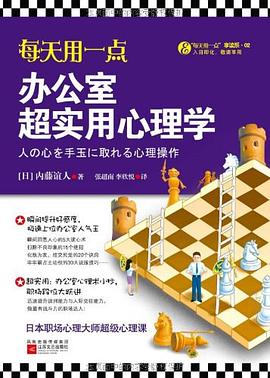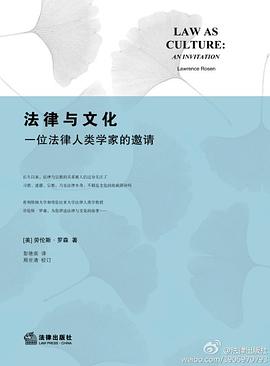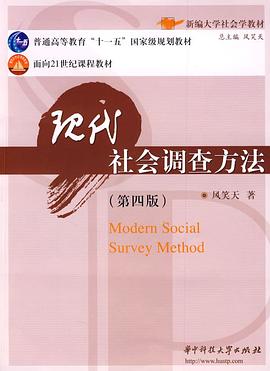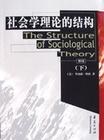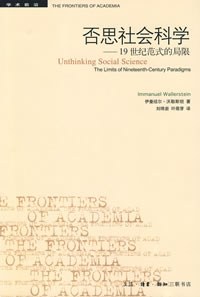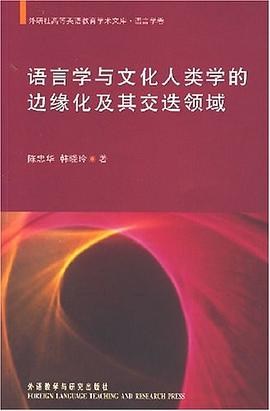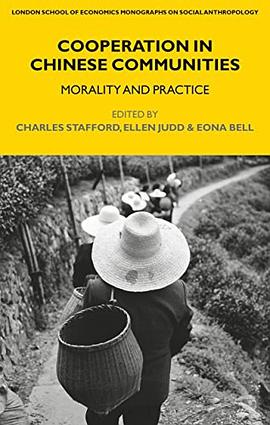

具体描述
When humans cooperate, what are the social and psychological mechanisms that enable them to do so successfully? Is cooperativeness something natural for humans, built in to our species over the course of evolution, or rather something that depends on cultural learning and social interaction? This book addresses these central questions concerning human nature and the nature of cooperation.
The editors present a wide range of vivid anthropological case-studies focused on everyday cooperation in Chinese communities, for example, between children in Nanjing playing a ballgame; parents in Edinburgh organising a community school; villagers in Yunnan dealing with “common pool” resource problems; and families in Kinmen in Taiwan worshipping their dead together.
On the one hand, these case studies illustrate some uniquely Chinese cultural factors, such as those related to kinship ideals and institutions that shape the experience and practice of cooperation. They also illustrate, on the other hand, how China's recent history, not least the rise and fall of collectivism in various forms, continues to shape the experience of cooperation for ordinary people in China today. Finally, they show that in spite of the cultural and historical particularity of Chinese cooperation, it does share some underlying features that would be familiar to people coming from radically different backgrounds.
作者简介
Charles Stafford is Professor at the London School of Economics, UK.
Ellen R. Judd is Distinguished Professor at the University of Manitoba, Canada.
Eona Bell is Affiliated Lecturer in Social Anthropology at Cambridge University and Research Officer at the London School of Economics, UK.
目录信息
读后感
评分
评分
评分
评分
用户评价
读完《Cooperation in Chinese Communities》这本书,我最大的感受是,它提供了一个非常有价值的视角来理解“社会资本”在华人社区中的具体体现。我之前对社会资本的概念有所了解,但总觉得有些抽象。这本书通过大量的案例,将社会资本的形成、维护和运用过程具象化了。 我尤其被书中关于“互惠原则”在华人社区合作中的重要性所吸引。这种互惠并非简单的等价交换,而是一种更长远、更具弹性的关系建立方式。一个人今天帮助了别人,明天可能就会在意想不到的地方得到回报。这种“人情债”的积累和偿还,虽然在某些语境下可能被视为效率低下的象征,但在书中被清晰地阐释为一种维系社区稳定和促进合作的强大力量。它让我意识到,华人社区的合作,很多时候是一种基于情感和信任的长期投资。
评分读完《Cooperation in Chinese Communities》,我最大的体会是,它让我看到了华人社区在应对外部挑战时所展现出的惊人韧性。这本书通过对历史上的几次重大危机,比如经济衰退、自然灾害,以及社会歧视等,华人社区是如何通过团结合作来渡过难关的,进行了深入的分析。 我特别被书中关于“资源整合”和“信息共享”在危机应对中的作用所吸引。在面对困难时,华人社区往往能够迅速地动员内部资源,并且有效地将信息传递给每一个成员。这种高效的组织能力和信息传递机制,在一定程度上帮助他们降低了风险,并且更快地恢复了正常生活。它让我意识到,华人社区的合作,并非仅仅是为了追求发展,更是一种面对不确定性和风险的自我保护和生存策略。这本书让我对华人社区的生存智慧有了更深的理解。
评分这本书,我不得不说,它在很大程度上改变了我对“集体决策”和“社区治理”的看法。《Cooperation in Chinese Communities》并没有简单地描述华人社区是如何组织起来的,而是深入探讨了他们是如何在缺乏外部强力干预的情况下,通过内部协商、共识形成等方式来做出集体决策的。 我特别被书中关于“调解”和“劝说”在解决社区内部矛盾中的作用所吸引。在很多西方社会,社区纠纷往往通过法律途径来解决,但在华人社区,很多时候是通过社区中有声望的长者、领袖,或者通过非正式的协商来达成和解。这种“说服教育”和“情感疏导”的方式,虽然看似不够“正式”,但在很多情况下却能够更有效地维护社区的和谐与稳定。这本书让我看到了,除了硬性的制度,软性的社会规范和文化传统,同样能够发挥强大的社区治理功能。
评分我原本以为对华人社区的了解已经 quite 深入了,但《Cooperation in Chinese Communities》这本书彻底刷新了我的认知。它不仅仅是一本关于“怎么做”的指南,更是一次对华人社区“为什么这样”的深度解读。我一直对那些在海外落地生根、蓬勃发展的华人社团感到好奇,究竟是什么样的力量让他们能够如此团结,如此有韧性?这本书给出了我想要的答案,而且答案比我预想的要丰富和复杂得多。它探讨了从经济互助、文化传承到政治参与等多个层面,华人社区是如何通过各种形式的合作来实现共同目标。 我尤其欣赏作者在分析过程中所展现出的严谨态度和广阔视野。他/她没有简单地将华人社区视为一个同质化的群体,而是细致地区分了不同地区、不同移民群体的合作模式和特点。例如,书中对东南亚华人社区的集体经济组织,以及北美华人社区的专业协会和商业联盟的对比分析,都让我看到了华人社区合作的多样性和适应性。它让我意识到,华人社区的合作并非僵化的模式,而是随着时代变迁和外部环境的变化,不断演进和创新的过程。
评分这本书,我必须承认,它在一定程度上挑战了我一些固有的关于“族群”和“社区”的认知。《Cooperation in Chinese Communities》并没有把华人社区描绘成一个铁板一块的整体,而是通过深入的案例研究,展现了其内部的复杂性和多样性。我原本以为华人社区的合作可能会更多地基于血缘、地缘等传统的纽带,但这本书让我看到了,在现代社会,基于共同的职业、兴趣,甚至是更抽象的价值观而形成的合作模式,也扮演着越来越重要的角色。 我特别欣赏作者对不同类型华人社区合作的分类和比较。例如,书中对海外华人商会、专业人士协会,以及一些更具社会公益性质的华人互助组织的分析,都让我看到了华人社区合作的广度和深度。它让我意识到,华人社区的合作并非仅仅是为了解决生存问题,更是在追求经济发展、文化传承、社会融入等多元目标。这本书让我对“华人社区”这个概念有了更丰富和动态的理解。
评分拿到《Cooperation in Chinese Communities》这本书,我原本以为会看到一些比较传统的关于华人社团的介绍,比如他们是如何组织活动、如何筹集资金等等。然而,这本书的内容远远超出了我的预期。它更像是一次对华人社区合作“底层逻辑”的深度挖掘,让我看到了隐藏在各种具体行为背后的文化、经济和社会因素。 我尤其被书中关于“信用”和“声誉”在华人社区商业交往中的重要性所吸引。在一些西方商业文化中,合同和法律往往是关系的基石,但在华人社区,很多交易和合作是建立在彼此的了解和信任基础上的。一个人的声誉,可能比一份合同更具有约束力。作者通过大量生动的案例,展现了这种“非正式制度”是如何有效地降低交易成本、促进商业合作的。这让我意识到,理解华人社区的合作,必须跳出单一的制度分析框架,去关注那些更深层的、非正式的规范和价值观。
评分我最近入手了一本关于华人社区合作的书,书名是《Cooperation in Chinese Communities》。坦白说,这本书的内容让我对华人社区的运作方式有了全新的认识,简直是颠覆了我之前的一些固有印象。我一直认为,华人社区可能更多的是个体之间的竞争,或者是基于血缘、地缘形成的松散联盟。然而,这本书深入剖析了在不同的历史时期、不同的地理环境下,华人是如何自发地、有组织地形成各种合作模式来应对挑战、谋求发展的。它不仅仅是讲述了表面上的互助,更是挖掘了这种合作背后深层的文化基因和理性考量。 书中对于“信任”的讨论尤其让我印象深刻。在华人社区中,信任的建立并非一蹴而就,而是需要通过长期的互动、承诺的履行以及共同的经历来沉淀。作者通过大量的案例研究,展现了这种信任如何在商业活动、社会互助、甚至是在面临外部压力时,成为华人社区凝聚力和生命力的重要基石。我尤其对书中关于“关系网”(Guanxi)的分析感到着迷,它并非简单等同于“关系”,而是一种动态的、基于互惠原则的社会资本,这种资本的维护和运用,很大程度上依赖于社区成员的共同理解和默契。这本书让我明白,理解华人社区的合作,就必须深入理解这种独特的社会资本是如何形成和发挥作用的。
评分我原本以为《Cooperation in Chinese Communities》这本书会偏重于宏观的社会学分析,但它所呈现的内容却充满了生活气息和人情味。作者通过对大量华人社区日常互助行为的细致描摹,让我看到了合作在华人生活中的重要性。 我尤其被书中关于“邻里互助”和“社区服务”的案例所打动。从帮助新移民安顿下来,到为社区老人提供照料,再到组织文化活动,这些看似微小的善举,却构成了华人社区最温暖的底色。这些合作并非源于法律的强制,而是发自内心的关怀和责任感。它让我意识到,真正的社区合作,不仅仅是经济和政治上的联盟,更是一种基于人文关怀和共同体意识的情感连接。这本书让我看到了华人社区合作中那些闪耀着人性的光辉的细节。
评分这本书,我必须承认,它在一定程度上改变了我对“集体主义”和“个体主义”这两个概念的理解。在西方社会浸淫已久,我总是习惯于用个体主义的视角去审视社会运作,认为个体利益最大化是驱动社会进步的根本动力。然而,《Cooperation in Chinese Communities》却让我看到了在华人社区中,一种更为复杂和 nuanced 的动力机制。它并非否定个体的重要性,而是强调在特定语境下,个体与群体之间的相互依存和协同效应。 我特别被书中关于“情理法”的讨论所吸引。在很多情况下,华人社区的合作并非完全依赖于明确的法律条文,而是更多地建立在人情、道德和共识的基础之上。这种“人治”的色彩,虽然在某些西方人看来可能存在争议,但在书中被清晰地阐释为一种高效的、适应特定社会文化背景的合作方式。它不是鼓励无视法律,而是说明在法律框架之外,还有一种通过情感纽带和共同价值观来维系社区运转的强大力量。这本书让我开始重新思考,我们是否应该用更开放的心态去理解和接纳不同的社会合作模式。
评分我一直对移民社区的历史和社会结构有着浓厚的兴趣,所以当看到《Cooperation in Chinese Communities》这本书名时,就毫不犹豫地入手了。这本书没有让我失望,它提供了一个非常深入和全面的视角来理解华人社区的运作。我特别喜欢作者在分析中对历史脉络的梳理,他/她并没有将华人社区的合作视为一种孤立的现象,而是将其置于更广阔的历史和社会背景下进行考察。 书中关于早期华人移民如何在美国、加拿大等国家建立互助会、宗亲会等组织来应对歧视和生存困境的描述,让我深感震撼。这些组织不仅仅是简单的互助团体,更是华人社区在异国他乡建立身份认同、维护尊严和争取权益的重要平台。作者对这些历史事实的细致呈现,让我对先辈们的智慧和勇气充满了敬意。而且,书中对这些组织如何在不同时期进行转型和演变的分析,也让我看到了华人社区的生命力和适应性。
评分 评分 评分 评分 评分相关图书
本站所有内容均为互联网搜索引擎提供的公开搜索信息,本站不存储任何数据与内容,任何内容与数据均与本站无关,如有需要请联系相关搜索引擎包括但不限于百度,google,bing,sogou 等
© 2026 book.quotespace.org All Rights Reserved. 小美书屋 版权所有

